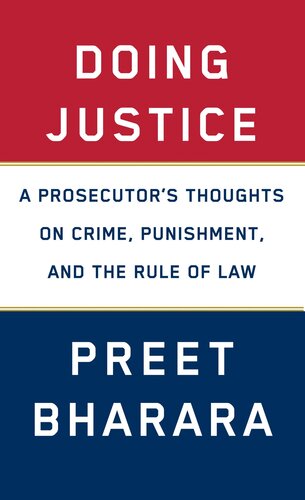
Doing Justice
A Prosecutor's Thoughts on Crime, Punishment, and the Rule of Law
کتاب های مرتبط
- اطلاعات
- نقد و بررسی
- دیدگاه کاربران
نقد و بررسی

February 1, 2019
The former federal prosecutor for the Southern District of New York skillfully explains how he approached his job, offering a mixture of guiding principles and compelling anecdotes.Although appointed by Barack Obama in 2009 and fired in 2017 by Donald Trump, Bharara refrains from either praising Obama or settling scores with Trump. The author organizes his book according to the way a criminal case normally unfolds: "Inquiry," about investigating an alleged crime; "Accusation," about whether to actually charge a defendant with breaking a law; "Judgment," about the court proceedings; and "Punishment," about the steps taken when a defendant is found guilty. Unlike many lawyers who write books, Bharara refreshingly avoids jargon, striking a conversational tone and regularly employing analogies and metaphors that make his points easily understandable. For example, while explaining that stockbrokers complete countless legal transactions while also cheating the system, Bharara writes that just because a motorist usually observes the posted speed limit, that behavior does not constitute evidence that the driver never exceeds the speed limit. Among the most compelling anecdotes, Bharara explains the successful 2010 prosecution of Faisal Shahzad, the Times Square Bomber, and offers clear reasons, however controversial, why his office never prosecuted high-ranking Wall Street and banking executives for the consequences of the 2008 financial meltdown that harmed millions of Americans. Throughout the book, the author admits to uncertainties about whether or not to prosecute apparent wrongdoing in a variety of cases, and he candidly expresses regrets about some of his decisions. As he astutely notes, sometimes there are no "correct" answers--e.g., in the social media era, how should a prosecutor deal with a Facebook post that a young man plans to enter a school with a rifle, before violence occurs? Rarely does Bharara offer glimpses into his private life, but he does share a few instances of the calumny he has faced due to his Indian heritage.An engaging tour from beginning to end.
COPYRIGHT(2019) Kirkus Reviews, ALL RIGHTS RESERVED.

Starred review from February 25, 2019
In this fascinating combination of memoir and ethical-legal manifesto, former U.S. attorney Bharara posits that "the model of the American trial has something to teach us... about debate and disagreement and truth and justice." He leads readers through the work of the U.S. Attorney's Office in Manhattan, in sections dedicated to inquiry (asking questions, conducting fair interrogations), accusation (choosing if and when to levy charges), judgment (trials, verdicts), and punishment (sentencing, prison reform). His prose has the quality of a well-written speech, with philosophical pronouncements ("Doing justice sometimes requires... a spark of creativity or innovation") followed by supporting tales from both his legal career and his personal life, recounted in a superbly accessible and conversational, even humorous, tone (at one point contrasting media depictions of justice with "the real world... where testosterone doesn't flow like a river in the streets"). Bharara also reminds readers that, while the law is an incredible tool, it is people who create or corrupt justice. With its approachable human moments, tragic and triumphant cases, heroic investigators, and depictions of hardworking everyday people, this book is a rare thing: a page-turning work of practical moral philosophy. Agent: Elyse Cheney, the Cheney Agency.

March 1, 2019
Prosecutors tend to work behind the scenes in the justice system. This book highlights their role on a Federal level as reflected in the operation of the Southern District of New York's U.S. Attorney's Office. Bharara (New York Univ. Sch. of Law) held that position for more than seven years until his firing in 2017. This case study focuses on his tenure in the Southern District, covering a variety of high-profile cases on topics ranging from insider trading and terrorism to miscreant cops and abusive correctional officers. Initial chapters explore case inquiry issues involving confirmation bias, wrongful convictions, confessions and interrogations, and innovative workarounds in a culturally conservative environment. Sections are organized around traditional phases of the justice process from accusation and trial preparation to a reconsideration of punishment and the need for reform. Using an informal style, the author recalls successes, failures, and controversies as well as extended personal insights, and an emphasis on stories rather than statistics. Though rooted in New York City, the cases and issues discussed are often national in scope. VERDICT This is a relevant and thought-provoking commentary on truth and justice from the unique perspective of a high-level former U.S. Attorney.--Antoinette Brinkman, formerly with Southwest Indiana Mental Health Ctr. Lib., Evansville
Copyright 2019 Library Journal, LLC Used with permission.

February 15, 2019
More than ever, Americans are cognizant of terms of law. Phrases such as cooperative witness and plea bargain are bandied about with disarming familiarity. Perhaps this is due to the preponderance of news about crimes both petty and major; perhaps it is the omnipresence of courtroom dramas in fiction and film. Whatever the source, the legal world can be tricky to fathom and downright intimidating to anyone caught in its glare. Bharara, the former U.S. attorney for the Southern District of New York, examines the scope of jurisprudence from the vantage point of federal interpretation and execution but also advises citizens on how to stay on the right side of the law in public and private. Bright with anecdotes from his lengthy and illustrious career, Bharara's razor-edge judgments about punishment, procedure, outcome, and outlook address issues of governance and moral grounding that form the crux of the nature of justice. Bharara speaks with a clear, firm, and engaging voice in this essential primer about the importance of a fair and open justice system.(Reprinted with permission of Booklist, copyright 2019, American Library Association.)

























دیدگاه کاربران